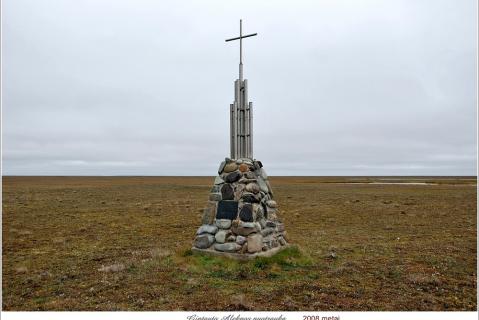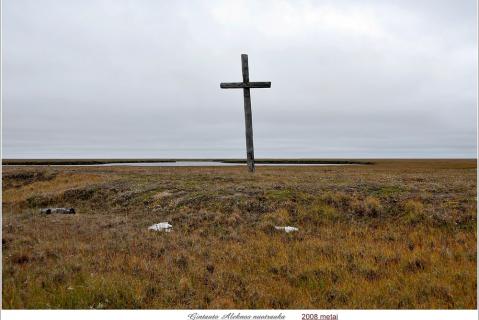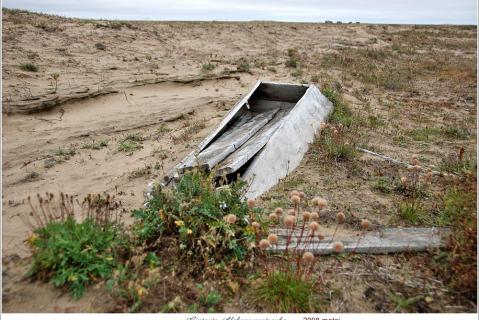In 1942-1947 forced settlers, mainly Lithuanians and Finns deported from the Leningrad Region, were based on the Trofimovsk Island in the delta of the Lena river. They were put to work, preparing and processing fish. Those exiled there recall that half the settlement’s population died in 1941-1943. The first burials were in common graves, shared by Finns and Lithuanians. The numbers who were buried then has not been established; lists of the Lithuanian deportees have been published in Lithuania. In 1949 the factory closed. In the mid-1950s the settlement was shut down and the cemetery abandoned.
Storms destroyed the burial area. In 1989 a Lithuanian expedition erected a memorial at the cemetery. An inscription in four languages (Lithuanian, Russian, Yakut and Finnish) reads: “Forcibly torn from their native land, fallen but not forgotten”. There were reports that, as of 2014, neither the burials nor the memorial had survived since the island had sunk beneath the water.
Research on the Genocide of the Lithuanian People (Lietuvos gyventoju Genocidas; 3 vols. 1999-2009) contains about 130,000 biographical entries (in Lithuanian). Vol. 2 covers the period from 1942 to 1947 and see Deportation of Lithuanians, 1941-1951 for the 28 other burial grounds and commemorative sites on the Map of Memory. The List of Repressed Finns provides 18,000 names (in Latin and Cyrillic scripts).
The Memorial online database (2025) lists 9,675 victims in the Republic of Sakha (BR 7,417).
402 were condemned to death; charges against 2,145 were dropped (23 died in captivity). Over 3,000 were sent to the camps. The Book of Remembrance and police records name families and individuals (total 3,860) who became forced settlers and deportees or were born in Yakutia’s special settlements (1,103): 93 were accused of belonging to the Organisation of Ukrainian Nationalists, 401 were “kulaks”, 746 Soviet Germans, and 430 sent to the Bulunsky district (almost all born in the Leningrad Region), 37 of whom worked on the Trofimovsk Island.
| State of burials | Area | Boundaries |
|---|---|---|
|
have not survived
|
not determined
|
not delineated
|
[ original texts and hyperlinks ]
D. Grinkeviciute, “Lithuanians on the Laptev Sea”, In the Permanently Frozen Land; translated by E. Kaktyn as Lithuanians on the Frozen Sea, Yakutsk, 1995
Yu.Riehkalainen, “The Inkerman Finns. History and Fate”, Finnish Notes, Helsinki, 2006 (Issue 9)
“Trofimovsk Island. Cemetery of forced labourers and special settlers”, Virtual Museum of the Gulag [retrieved, 26 May 2022; no longer accessible]



